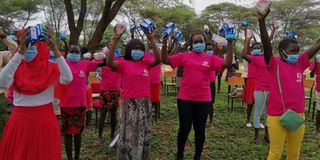Like Scotland, Kenya can end period poverty

Girls from Baringo County excited after receiving sanitary towels from a well wisher, Ms Diana Chebotibin, in October, 2020.
What you need to know:
- Many girls resort to using unhygienic substitutes such as rags, newspapers, banana leaves, and even cow dung. Worse still, others turn to prostitution to get these essential products.
- Globally, women and girls’ rights activists are asking governments to integrate sexual and reproductive health needs of women and girls in Covid-19 responses.
- The United Nations estimates that as many as 20 million girls drop out of schools (globally) every year because they cannot deal with their menstrual flows.
Menstruation is an uncomfortable, painful, inconvenient and expensive experience for many women and girls. It occurs once a month for approximately three to seven days; about three months a year.
Those with no access to menstruation products are left to their own devices to manage their menstruation cycles, with many unable to participate meaningfully in daily life due to the difficulty of managing bleeding.
Many girls resort to using unhygienic substitutes such as rags, newspapers, banana leaves, and even cow dung. Worse still, others turn to prostitution to get these essential products.
Unfortunately, period poverty – the lack of access to menstrual products – increases the risk of toxic shock syndrome, cervical cancer and other dangerous infections according to research.
While period poverty has always been the stark reality for some, Covid-19 has exacerbated menstruation-related challenges, especially for women and girls from urban slums and poor rural communities.
Menstrual hygiene
Globally, women and girls’ rights activists are asking governments to integrate sexual and reproductive health needs of women and girls in Covid-19 responses. In Kenya, at least 2.6 million girls currently require menstrual hygiene materials – pads, underwear and soap, according to Unesco.
In April last year, local women rights organisations petitioned the government to spend at least 30 per cent share of Covid-19 funds on gender responsive strategies including distributing cash relief, food and sanitary towels to vulnerable women and girls.
The pandemic aside, the menstrual hygiene situation in Kenya has been, and remains dire. Thousands of adolescent girls have to contend with hurdles as they go through formal schooling. In September last year, a school girl in Bomet committed suicide after her teacher humiliated her for staining her uniform during her menses.
It is sad this happened nine years after Kenya launched the Sanitary Towels Programme in 2011 – an initiative meant to provide pads to needy girls in public schools. It is the same year Kenya made sanitary towels tax-free.
Unfortunately, some girls do not receive the free sanitary towels. The government in 2019, admitted a lack of funds to provide sanitary towels as required by law, with Education CS George Magoha saying the Sh470 million provided can only supply girls for four months.
Lack of access to sanitary products means many girls drop out of school while on their period, putting them at greater risk of child marriage and early pregnancy.
In 2017, President Uhuru Kenyatta signed the Basic Education Amendment Act (2016) placing the responsibility of providing free, sufficient and quality sanitary towels on the government, to reduce the number of girls missing school.
In 2019, the government launched the Menstrual Hygiene Policy 2019-30 to among other things, ensure women and girls have access to safe and hygienic products.
All these measures were aimed at ending period poverty. However, that goal is yet to be met with Education CS last year admitting that the government scheme had not met its target, and many girls are still missing school during their menses.
Disadvantaged girl
The United Nations estimates that as many as 20 million girls drop out of schools (globally) every year because they cannot deal with their menstrual flows. The Education ministry estimates that a girl absent from school for four days a month loses 13 learning days equivalent to two weeks per term.
This means that in an academic year, a disadvantaged girl loses up to 39 learning days, something that could be remedied by proper implementation of the sanitary towels program.
Access to sanitary products would also be of limited help if schools don’t have the supporting infrastructure, such as separate bathrooms for girls with doors and locks for privacy, a luxury in most of our rural public schools.
Menstruation is a global issue and there is evidence of action to address its challenges. Last year, Scotland became the first country in the world to provide free period products for all women, while Germany reduced tax on sanitary towels from 19 per cent to seven per cent.
Canada, Australia and India followed suit. France, Spain, Poland and Austria have also lowered tax on sanitary products. A handful of US States have also passed laws mandating free period products be provided in schools. The UK government too, rolled out free period products in all primary and secondary schools in England last year.
Kenya’s menstrual policies all look good on paper, but wouldn’t work in a real-world environment if not managed well. With proper management, we too, like Scotland, can make sanitary products free for all. Every woman is entitled to safe and hygienic menstrual facilities, and the right to manage menstruation without shame or stigma.
It is time to change the narrative, girls and women have suffered enough.
Dorcas Muga is the Gender Editor at NMG.





